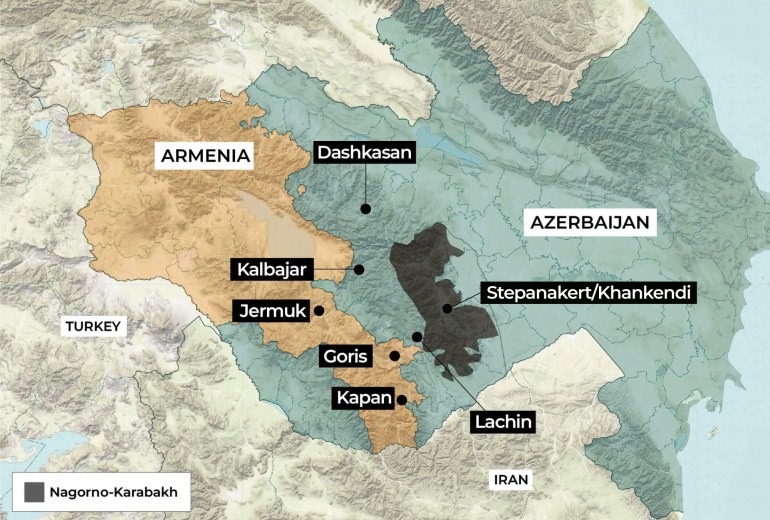In recent weeks, Armenia accused Azerbaijan of building up troops and decried a blockade of its only land link to Nagorno-Karabakh.
Renewed fighting in the region comes almost three years after a brief but brutal war with Armenia over the area, in which more than 6,000 people were killed.
The region is globally recognised as part of Azerbaijan, but has a majority ethnic Armenian population that broke from Baku’s control after a war in the early 1990s.
Here is how the world is reacting to the fighting:
Armenia
Armenian Prime Minister Nikol Pashinyan urged Russia and United Nations to take action to stop the fighting.
“First of all, Russia must take steps and, secondly, we expect the UN Security Council to also take steps,” Pashinyan, whose country is in a military alliance led by Moscow, said in televised comments.
“We must not allow certain people, certain forces to deal a blow to the Armenian state. There are already calls, coming from different places, to stage a coup in Armenia.”
Armenia’s defence ministry has denied its troops were present in Nagorno-Karabakh.
The country’s security council said warned of large-scale unrest in the country after protesters took to the streets over the government’s handling of escalating tensions with their neighbor.

Turkey
Turkish President Recep Tayyip Erdogan has expressed full support for Azerbaijan’s military operation.
“We support the steps taken by Azerbaijan – with whom we act together with the motto of one nation, two states – to defend its territorial integrity,” Erdogan said in an online statement.
Earlier, the foreign ministry said Azerbaijan was forced to take action in Nargorno-Karabakh after its concerns were not removed following the 2020 conflict with Armenia in the region.
“As a result of its rightful and legitimate concerns about the situation on the ground that it voiced repeatedly not being alleviated in nearly three since the end of the Second Karabakh War, Azerbaijan was forced to take measures it deems necessary on its sovereign territory,” a statement by the ministry read.
“We believe that continuing the comprehensive talks between Azerbaijan and Armenia, which have been held meticulously until today, in a result-oriented manner is the only way to achieving peace, security, prosperity, and lasting stability in the region.”
Russia
Russia, which brokered a ceasefire in 2020 and has peacekeepers in the region, has called for an end to the fighting.
“We are deeply concerned about the sharp escalation of the situation in Nagorno-Karabakh,” Ministry of Foreign Affairs spokeswoman Maria Zakharova said at a news briefing.
“The main thing is to prevent human casualties … the main thing is to convince Yerevan and Baku to come to the negotiating table,” Kremlin spokesman Dmitry Peskov told reporters.
Peskov said the Russian military had been in contact with both Baku and Azerbaijan and that Moscow was urging talks.
European Union
The EU condemned the escalation in Nagorno-Karabakh and called on Azerbaijan to stop its military activities, the EU’s foreign policy chief Josep Borrell said in a statement.
“We call for the immediate cessation of hostilities & Azerbaijan to stop the current military activities,” he said on social media platform X, formerly known as Twitter.
The EU condemns the military escalation in Karabakh & deplores loss of lives
We call for the immediate cessation of hostilities & Azerbaijan to stop the current military activities
Commitment by all sides is required to work towards negotiated outcomeshttps://t.co/6YK7h28Ffv
— Josep Borrell Fontelles (@JosepBorrellF) September 19, 2023
United Nations
United Nations spokesman Stephane Dujarric told Al Jazeera that the situation in Nagorno-Karabakh was “very concerning”.
“It’s very important that all the activities cease and both parties go back to a sustained dialogue to avoid any further clashes,” he said.
Iran
Iran on Tuesday offered to mediate the conflict between Azerbaijan and Armenia and called for compliance with the
2020 ceasefire agreement.
Iranian Foreign Ministry spokesman Nasser Kanaani called for adherence to the ceasefire agreement between Azerbaijan and Armenia,
which both share a border with Iran.
Germany
Azerbaijan has broken its promise by resorting to military action in Nagorno-Karabakh, German Foreign Minister Annalena Baerbock said.
“Baku’s promise to refrain from military action was broken. Azerbaijan must immediately stop shelling and return to the negotiating table,” Baerbock said on the sidelines of the UN General Assembly (UNGA) in New York City.
United States
US Secretary of State Antony Blinken will hold urgent talks Tuesday with all sides to end the “egregious” operation by Azerbaijan, an official said.
After the opening of an aid path on Monday, “We were hopeful that we were going to be able to adapt to the longer-term issues,” a US official said on condition of anonymity according to the Reuters news agency, “so that makes this incident overnight particularly egregious and particularly dangerous.”
In a statement, Blinken urged Azerbaijan to end the military operation “immediately” and said the US was “deeply concerned”.
France
Paris has called for an urgent UN Security Council meeting to end the crisis.
“There is no pretext that justifies such a unilateral action,” the French foreign ministry said in a statement, adding that it “threatens thousands of civilians already affected by a month-long illegal blockade and which runs against efforts by the international community to reach a negotiated settlement.”
Catherine Colonna, the foreign minister, said Baku’s operation is “illegal, unjustifiable, unacceptable”.
“I would like to emphasise that we hold Azerbaijan responsible for the fate of Armenians of Nagorno-Karabakh,” she told journalists at UNGA in New York.
French President Emmanuel Macron in a call with Armenian Prime Minister Nikol Pashinyan urged “an immediate resumption of discussions” to find a “just and lasting peace” between Armenia and Azerbaijan, calling for an “immediate cessation of the offensive”, according to a press statement.
